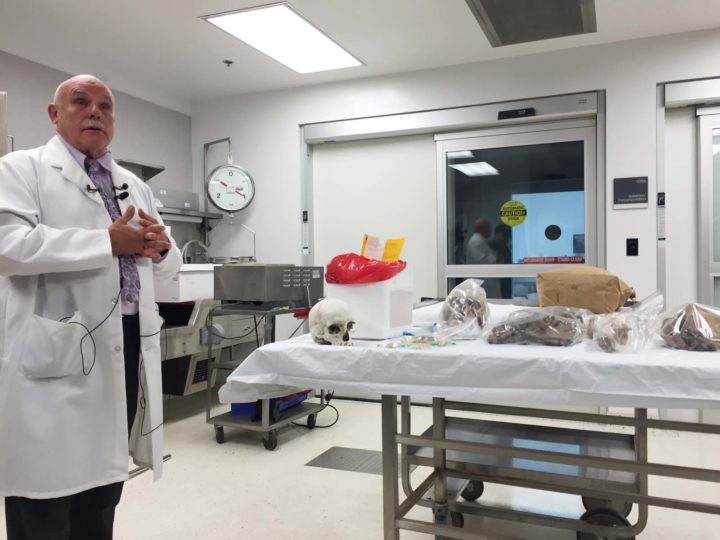Daily Business Report-Wednesday, March 20, 2019
Chief County Medical Examiner Dr. Glenn Wagner in an examining room for death investigations. (Photos courtesy of San Diego County)
San Diego County medical examiner
officials put 20 years of data online
By Yvette Urrea Moe | County of San Diego Communications Office
Valuable comparisons and conclusions can be drawn from the types and circumstances of sudden unexpected deaths that occur in San Diego County, and in changes over time. Officials with the San Diego County Department of the Medical Examiner are releasing 22 years’ worth of data–from 1997 to the third quarter of 2018–in a free searchable online portal. The site makes over 59,000 records available.
“We feel strongly that this information learned from the deaths that we’ve investigated can be used to help the living and even change lives for the better,” said Chief Medical Examiner Dr. Glenn Wagner. “Our vision is to be a data-forward agency. The idea is to make the data available for the public, media, other departments or agencies that may have some overlap with segments of the people included in the report, and researchers who may be able to look at the data and provide insights back to the Department of the Medical Examiner.”
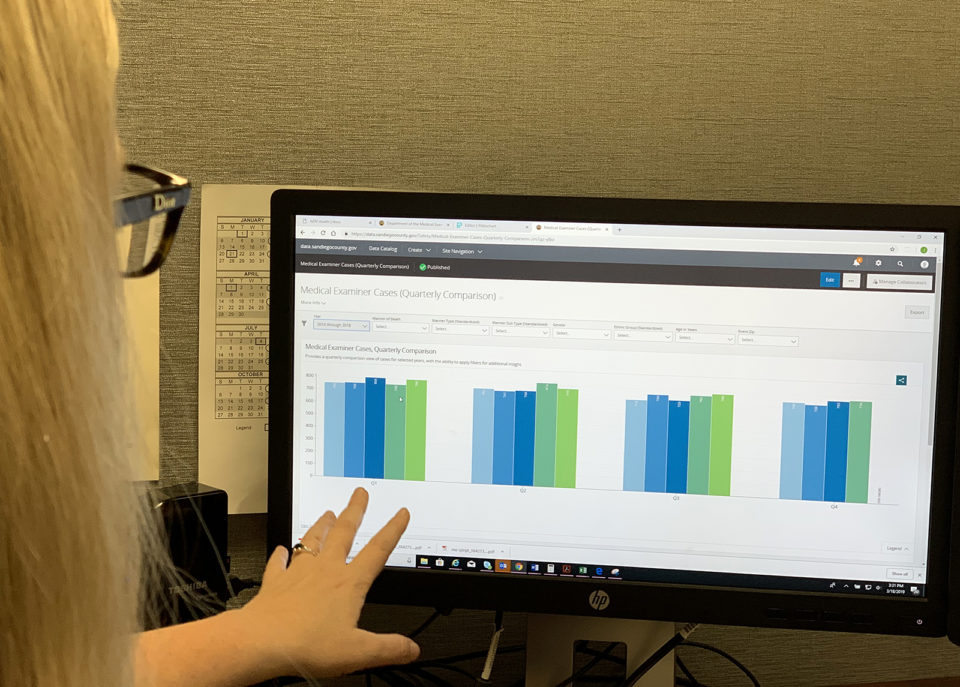
The Medical Examiner does not investigate all deaths in San Diego County. Approximately 40 percent of all deaths are reported to the Medical Examiner, and of those more than 3,000 are brought in for an examination. In general, the Medical Examiner has jurisdiction for all accidental deaths, homicides, suicides, in-custody deaths, and any sudden or unexpected natural deaths in which the decedent had not seen their health care provider in the last 20 days of life.
“The types of cases that fall under the Medical Examiner’s scope are of interest from both a public health and public safety aspect. The ability to compare San Diego statistics with other regional, state and national statistics is as important as a jurisdiction’s crime statistics,” said Wagner.
Making the data available for public searches has been an objective for the department for several years. Project managers studied how other jurisdictions locally and across the nation shared data to try to make the County’s data portal intuitive, responsive and easy to navigate. The data follows privacy guidelines that protect the deceased person and person’s family, and so does not include names, dates of birth, case numbers or specific addresses.
The data is available in raw form and presented in some pre-assembled data sets such as opioid, fentanyl and suicide deaths, which are commonly requested by media outlets.
To access the data portal and for other San Diego County Medical Examiner information, visit the office’s Statistics Page.
____________________

SDSU announces new center
for advancing global business
San Diego State University’s Fowler College of Business is now home to the Center for Advancing Global Business (CAGB), a think tank for issues related to international business.
The newly created CAGB will serve as an umbrella for SDSU’s Center for International Business Education and Research (CIBER) and the Charles W. Hostler Institute on World Affairs.
“The CAGB represents the continuing and expanding global impact of business education at the Fowler College of Business,” said Lance Nail, Thomas & Evelyn Page Dean at the college. “Current and future graduates must understand the complexities of operating and interacting in a global environment. This center advances our college’s ability to continuously educate global business leaders – as students and as graduates.”
Established in 1989 and now one of 15 federally funded national centers of excellence, SDSU CIBER has played a critical role in providing support for the university’s highly ranked international business program.
As the CAGB expands, it will seek public and private funding to support its activities, particularly in the San Diego business community. An advisory board of business and community leaders will provide resources and guidance and serve as a critical liaison between the CAGB and the business community.
____________________
ScaleMatrix acquires Instant Data Centers
ScaleMatrix, a provider of variable density colocation and hybrid hosting services, announced the acquisition of Instant Data Centers, formerly Elliptical Mobile Solutions, an Arizona-based company focused on providing ruggedized micro data centers for the Edge.
____________________
Burnham-Moores Center for Real Estate
to hold 23rd annual Real Estate Conference
The Burnham-Moores Center for Real Estate will host its 23rd annual Real Estate Conference on March 28 at the Hilton San Diego Bayfront on Park Boulevard in Downtown San Diego. The cost is $195 per person.
The conference attracts more than 600 high-level real estate professionals annually.
Geoffrey Kasselman, executive managing director of Newmark Knight Frank and immediate past president of SIOR Global, will open the conference as the first featured speaker. Kasselman is an innovation-minded futurist focused on harnessing transformative disruption and technology convergence in order to bring actionable opportunities to the commercial real estate industry.
The second featured speaker will be Spencer Levy, chairman of Americas research and senior economic advisor for CBRE. He will discuss cause and effect of macro real estate trends throughout the country.
____________________
Scientists detect cause of rare
pediatric brain disorder
An international effort led by physician-scientists at Rady Children’s Institute for Genomic Medicine (RCIGM) has identified the cause of a devastating pediatric brain disorder paving the way for the first step in developing potential therapies for this rare neurodegenerative condition.
Investigators performed advanced genetic tests on blood samples from seven children with neuro-development disabilities who were evaluated by doctors in San Diego, Montreal and Cairo. This led to the discovery of mutations in the VARS gene, which had not previously been linked to human disease.
“These children showed epileptic seizures and abnormalities evident on brain MRI scans,” said Joseph Gleeson, M.D., director of neurodevelopmental genetics at RCIGM and professor of neuroscience and pediatrics at UC San Diego School of Medicine. “Although no treatment currently exists for this condition, the results are important as the first step in guiding research directed at targeted therapies.”
____________________
Stephanie Bulger and Laura Gonzalez
honored for contributions to education
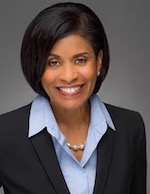
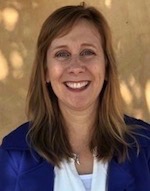
San Diego Community College District (SDCCD) Vice Chancellor Stephanie Bulger and Miramar College Professor Laura T. Gonzalez were among those honored at the 79th State Assembly District’s Salute to Women Leaders – Community Recognition Ceremony on March 17 for their contributions to education.
As the SDCCD’s Vice Chancellor of Instructional Services, Bulger is the chief instructional officer at one of California’s largest community college districts, which serves more than 100,000 students at San Diego City, Mesa, and Miramar colleges and San Diego Continuing Education. Bulger’s resume includes serving on the Executive Committee of the San Diego County College and Career Readiness Consortium and the Regional Oversight Committee of the state’s Strong Workforce Program, in addition to being the SDCCD’s representative to the League for Innovation in the Community College.
Gonzalez, a professor of anthropology, is Miramar College’s faculty environmental sustainability coordinator. She has taught courses in cultural anthropology, physical anthropology, and the cultures of Mexico for 15 years. Gonzalez has done extensive ethnographic fieldwork in Mexico and India, and she is a past-president of the Society for Anthropology in Community Colleges, a section of the American Anthropological Association that focuses on teaching anthropology.
In addition, Gonzalez co-authored Through the Lens of Anthropology with Robert James Muckle, which uses the twin themes of food and sustainability to illustrate the connected nature of anthropology’s four major subfields: archaeology, and biological, cultural, and linguistic anthropology. Students describe Gonzalez as a caring and exceptional professor who truly enjoys her work.
____________________
Personnel Announcements
Retired judge Gerald Jessop joins JAMS
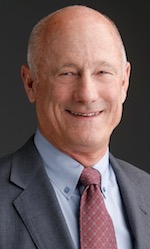
JAMS, a provider of alternative dispute resolution services worldwide, announced the addition of Gerald Jessop, a retired San Diego Superior Court judge, to its panel. Jessop, a certified family law specialist since 1991, joins JAMS following 20 years of service with the San Diego Superior Court. During his court tenure, he was assigned to the Family Law Division for 13 years, where he presided over complex dissolutions involving the characterization and division of property, child custody (including move-away disputes) and child and spousal support matters. He was also assigned for five years to the Probate Division, where he presided over the administration of probate estates, trusts, guardianships and conservatorships.
Based in the San Diego Resolution Center, Jessop will serve as an arbitrator and mediator in a variety of practice areas, including family law and probate.
Prior to his election to the bench in 1998, Jessop was a partner at the law firm of Ward, Thorn & Jessop and a probate trust officer with San Diego Trust & Savings Bank. He also taught family law at the University of California San Diego Extension program and volunteered his time on the Family Law Panel.
In 2019, Jessop was recognized as the Outstanding Family Law Judge of San Diego County by the American Academy of Matrimonial Lawyers for his work on the family law bench.
Jessop received his B.S. in business administration from the University of Denver and his J.D. from the University of San Diego School of Law.
___________________
Former FBI special agent to head
San Diego Convention Center security
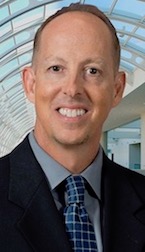
Todd Temple, a decorated former special agent with the Federal Bureau of Investigation, has been selected to lead the San Diego Convention Center Corporation’s security team. Temple will start as the director of public safety and guest services on April 2. He is replacing Josh Layne, who is leaving his role after 12 years of service.
Temple is a 22-year FBI veteran, serving as the current crisis management and special event coordinator of the FBI’s San Diego Field Office. During his FBI career, he served as a supervisory special agent of the San Diego Division’s Joint Terrorism Task Force and the Division’s Critical Incident Response Team.
Temple managed the division’s crisis response programs, which includes Command Post Operations, Special Agent Bomb Technicians, Special Events and the Evidence Response Team.
Within Special Events, he was responsible for FBI resources and response capability for large-scale special events in the city of San Diego, including Comic-Con International, the 2016 MLB All-Star Game, 2017 Breeder’s Cup, Rock n Roll Marathon, Big Bay Boom, San Diego County Fair and the Miramar Air Show.
Prior to his role in the FBI, Todd worked for the San Diego County Sheriff’s Department for six years.
___________________
___________________
Commentary
Democrats defying the will of voters
By Dan Walters | CALmatters Columnist
There’s long been a somewhat competitive relationship between the power of governors and legislators to make law and the ability of voters to overturn what the politicians wrought and/or make law themselves via the initiative process.
However in recent years that relationship has evolved from merely competitive to something approaching hostility.
Having achieved total domination of the Capitol, Democratic politicians clearly resent sharing lawmaking authority with voters. We have seen numerous attempts to kneecap the initiative process. We’ve seen Democratic attorneys general twist the ballot wording of measures they oppose, such as last year’s effort to repeal new gas taxes, and we’ve seen those attorney generals and governor refuse to defend voter-approved initiatives in court.
The latest wrinkle appears to be an increasing willingness by the dominant Democrats to thumb their noses at voters by pursuing policies that contradict what the voters decreed.
Two such examples popped up this month.
Gov. Gavin Newsom declared that he will not allow any more executions of criminals – murderers mostly – and ordered the state’s execution chamber to be demolished.
He justifies it as a moral issue, even though the state’s voters have repeatedly declared their support for capital punishment – twice in this decade alone.
Just days later, a bloc of Democratic members of the Assembly unveiled a package of housing bills, including one that would cap annual rent increases in local jurisdictions that do not have local rent control ordinances.
If enacted, it would, in effect, repeal the state’s Costa-Hawkins Rental Housing Act, which prohibits local governments from imposing rent control on units built after 1995.
Just four months ago, California’s voters had the opportunity to repeal Costa-Hawkins via Proposition 10, which was placed on the ballot by rent control advocates. Voters refused to pass the measure.
The author of Assembly Bill 1482, David Chu of San Francisco, justified his end run around voters by saying it’s needed to address the state’s housing affordability crisis.
“In recent years we have seen massive rent gouging. Not just 10 percent increases, or 25 percent, but 50 percent, 100 percent, 200 percent,” Chiu said. “Our bill would cap the amount a rent can be increased annually at a level sufficiently above the Consumer Price Index to allow a landlord to receive a fair return.
“Our Legislature has failed to act to address the plight of struggling tenants,” Chiu added, saying his bill “would for the first time create some rent certainty, allowing tenants to plan for their futures and remove the risk of unexpected rent increases.”
Capital punishment and rent control are serious issues and what Newsom declared and what Chiu’s bill would do face stiff opposition from those who believe the death penalty is a deterrent and that rent control would worsen California’s housing crisis by discouraging badly needed construction.
However, there’s another issue here: whether, indeed, ultimate political power is vested in voters, or in officeholders.
If governors and legislators can simply ignore the will of voters, or block them from making decisions politicians don’t like, then California becomes more autocratic and less small-d democratic.
That’s the sort of thing that Third World dictators, such as Venezuela’s current despot, do. It’s the sort of thing that Democratic politicians routinely accuse Donald Trump of doing.
It disrespects the people they purport to serve.
CALmatters is a public interest journalism venture committed to explaining how California’s state Capitol works and why it matters. For more stories by Dan Walters, go to calmatters.org/commentary

